BY KEVIN CARR
Art is subjective, as is the appreciation for it and the accolades thrust upon it. This is no more evident that during award season each year, in which every film critic, entertainment journalism outfit and average moviegoer throws in their two cents as to what were the best and worst of the previous year.
The Academy Awards are famous for the nomination snubs (such as this year’s snubbing of Ben Affleck and Kathyrn Bigelow for Best Director), but less remembered are the performances that should have won but didn’t. Reasons for this range from the age of the average Academy voter to the sheer politics of the industry.
From the more-than eight decades of the Oscars, here is a look at some people who should have won Best Actor but did not.
1939
Jimmy Stewart, “Mr. Smith Goes to Washington”
Won by: Robert Donat, “Goodbye, Mr. Chips”
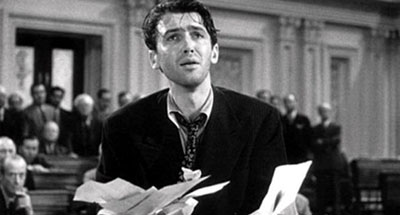 Ever since I saw “It’s a Wonderful Life,” I have had a soft spot for Jimmy Stewart in a Frank Capra film. While “It’s a Wonderful Life” will always be the gold standard for me, his performance in films like “You Can’t Take It With You” and “Mr. Smith Goes to Washington” are just as heartwarming and tender. This was early in their collaborative years, but looking back more than 80 years ago, it’s still hard to get Stewart’s filibuster out of my head while I barely remember “Goodbye, Mr. Chips.”
Ever since I saw “It’s a Wonderful Life,” I have had a soft spot for Jimmy Stewart in a Frank Capra film. While “It’s a Wonderful Life” will always be the gold standard for me, his performance in films like “You Can’t Take It With You” and “Mr. Smith Goes to Washington” are just as heartwarming and tender. This was early in their collaborative years, but looking back more than 80 years ago, it’s still hard to get Stewart’s filibuster out of my head while I barely remember “Goodbye, Mr. Chips.”
1941
Orson Welles, “Citizen Kane”
Won by Gary Cooper, “Sergeant York”
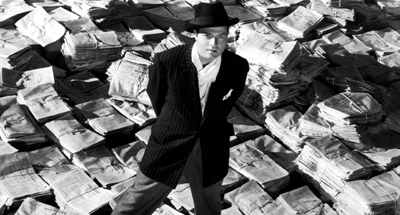 This is a no-brainer in retrospect. While “Sergeant York” is a perfectly fine film, it’s hard to argue that any movie lives on in terms of critical praise and audience awareness more than “Citizen Kane.” Sure, the film is most notable for being a groundbreaking work of filmmaking and storytelling, but Welles as a triple threat literally had the movie of his career with this film. Of course, he was probably too young to win, and in reflection, I doubt there’s a member of the Academy past or present who wouldn’t have given him the Oscar for this.
This is a no-brainer in retrospect. While “Sergeant York” is a perfectly fine film, it’s hard to argue that any movie lives on in terms of critical praise and audience awareness more than “Citizen Kane.” Sure, the film is most notable for being a groundbreaking work of filmmaking and storytelling, but Welles as a triple threat literally had the movie of his career with this film. Of course, he was probably too young to win, and in reflection, I doubt there’s a member of the Academy past or present who wouldn’t have given him the Oscar for this.
1964
Peter Sellers, “Dr. Strangelove”
Won by Rex Harrison, “My Fair Lady”
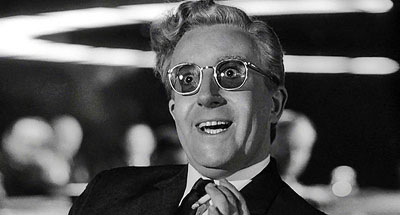 While I can appreciate “My Fair Lady,” it is far from my favorite musical film. And while Rex Harrison is fine in the role, he pales in comparison to Peter Sellers’ three-point brilliant performance in “Dr. Strangelove.” What could have been a trivial note of stunt casting was turned into a scene-stealer performance (or rather scene-stealing performances) by Sellers. He was balanced fantastically by George C. Scott, but it’s rare to see any actor so effectively play three different roles in a single film.
While I can appreciate “My Fair Lady,” it is far from my favorite musical film. And while Rex Harrison is fine in the role, he pales in comparison to Peter Sellers’ three-point brilliant performance in “Dr. Strangelove.” What could have been a trivial note of stunt casting was turned into a scene-stealer performance (or rather scene-stealing performances) by Sellers. He was balanced fantastically by George C. Scott, but it’s rare to see any actor so effectively play three different roles in a single film.
1976
Robert De Niro, “Taxi Driver”
Won by Peter Finch, “Network”
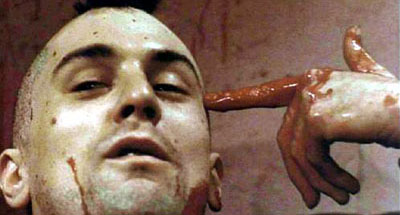 It’s hard to win against nostalgia and a dead guy, but that’s what De Niro was facing this year. Not to take anything away from Finch, but it was De Niro’s performance as Travis Bickle that helped set his (and Martin Scorsese’s) career on the fast track. Of course, the other thing that De Niro was fighting back then was the fact that he wasn’t the name brand that he is today. Had this come out ten years later, it would have been a slam dunk for him.
It’s hard to win against nostalgia and a dead guy, but that’s what De Niro was facing this year. Not to take anything away from Finch, but it was De Niro’s performance as Travis Bickle that helped set his (and Martin Scorsese’s) career on the fast track. Of course, the other thing that De Niro was fighting back then was the fact that he wasn’t the name brand that he is today. Had this come out ten years later, it would have been a slam dunk for him.
1984
Jeff Bridges, “Starman”
Won by F. Murray Abraham, “Amadeus”
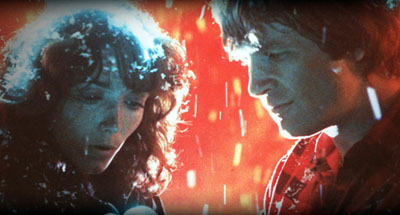 I’m a big fan of breakout roles, not just for actors but for genres. Science fiction and horror are often seen as lesser movies by the Academy, so when any of them are nominated, I tend to support them. Jeff Bridges, while he was a respected actor at the time, showed real chops with this film, even though it was in essence a run-of-the-mill sci-fi film. And at the time, F. Murray Abraham was all but unknown to the average moviegoer. Still, the biggest and possibly deciding hurdle that Bridges faced was being directed by John Carpenter, who was seen as a horror movie hack by so-called serious film critics.
I’m a big fan of breakout roles, not just for actors but for genres. Science fiction and horror are often seen as lesser movies by the Academy, so when any of them are nominated, I tend to support them. Jeff Bridges, while he was a respected actor at the time, showed real chops with this film, even though it was in essence a run-of-the-mill sci-fi film. And at the time, F. Murray Abraham was all but unknown to the average moviegoer. Still, the biggest and possibly deciding hurdle that Bridges faced was being directed by John Carpenter, who was seen as a horror movie hack by so-called serious film critics.
1987
Robin Williams, “Good Morning Vietnam”
Won by Michael Douglas, “Wall Street”
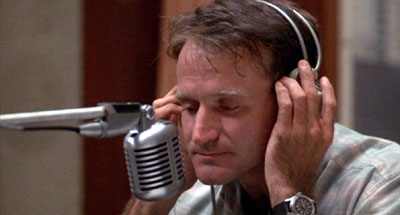 Like Jeff Bridge’s nomination in 1984, Robin William saw a breakout leading performance in “Good Morning Vietnam.” It was still a safe bet for the studio because he was playing a comedic character. However, the dramatic moments in the film overshadowed the well-known Robin Williams shtick. Of course, this was just the first in many fantastic performances that went only partially noticed by the Academy. (Also, had Williams won, perhaps we wouldn’t have gotten that awful “Wall Street” sequel a couple years back.)
Like Jeff Bridge’s nomination in 1984, Robin William saw a breakout leading performance in “Good Morning Vietnam.” It was still a safe bet for the studio because he was playing a comedic character. However, the dramatic moments in the film overshadowed the well-known Robin Williams shtick. Of course, this was just the first in many fantastic performances that went only partially noticed by the Academy. (Also, had Williams won, perhaps we wouldn’t have gotten that awful “Wall Street” sequel a couple years back.)
1993
Liam Neeson, “Schindler’s List”
Won by Tom Hanks, “Philadelphia”
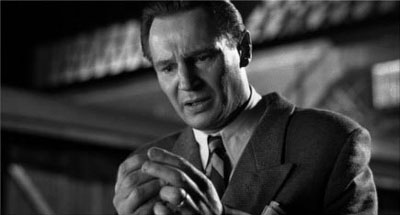 I don’t have anything against Tom Hanks, and it’s not that Liam Neeson had the performance of a lifetime in “Schindler’s List.” However, throughout award season, it was clear that Hanks was getting the award not for acting but rather for the politics behind the movie (as opposed to his bona fide win for “Forrest Gump” the following year). And those were some pretty powerful politics, considering the AIDS angle stole the vote from the Holocaust angle. Golly, those Academy voters were really in a quandary that year.
I don’t have anything against Tom Hanks, and it’s not that Liam Neeson had the performance of a lifetime in “Schindler’s List.” However, throughout award season, it was clear that Hanks was getting the award not for acting but rather for the politics behind the movie (as opposed to his bona fide win for “Forrest Gump” the following year). And those were some pretty powerful politics, considering the AIDS angle stole the vote from the Holocaust angle. Golly, those Academy voters were really in a quandary that year.
2002
Nicolas Cage, “Adaptation”
Won by Adrien Brody, “The Pianist”
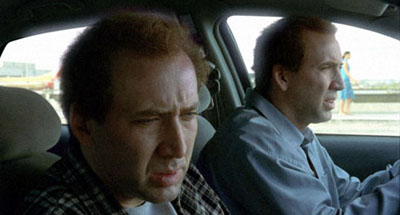 Much like Peter Sellers’ performance in “Dr. Strangelove,” Nicolas Cage’s performance in “Adaptation” was a brilliant mix of two roles. However, more importantly, this was Cage showing some real range, reminding us of his potential we saw in “Moonstruck” fifteen years earlier. Now, Cage has fallen into a sad caricature of himself, and we forget that he really has some great acting skill, evident in “Adaptation.”
Much like Peter Sellers’ performance in “Dr. Strangelove,” Nicolas Cage’s performance in “Adaptation” was a brilliant mix of two roles. However, more importantly, this was Cage showing some real range, reminding us of his potential we saw in “Moonstruck” fifteen years earlier. Now, Cage has fallen into a sad caricature of himself, and we forget that he really has some great acting skill, evident in “Adaptation.”
2003
Johnny Depp, “Pirates of the Caribbean: Curse of the Black Pearl”
Won by Sean Penn, “Mystic River”
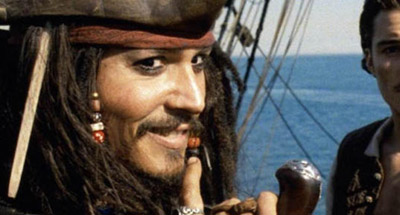 Acting isn’t necessarily about playing over-the-top or being the most notable character from a film. However, sometimes that counts. Johnny Depp certainly created an iconic role in “Pirates of the Caribbean: Curse of the Black Pearl,” to the point that Captain Jack Sparrow is now synonymous with pirates. However, this was probably just too popular of a role, and sadly the statue was taken home by the sourpuss-looking Sean Penn for the much less entertaining film.
Acting isn’t necessarily about playing over-the-top or being the most notable character from a film. However, sometimes that counts. Johnny Depp certainly created an iconic role in “Pirates of the Caribbean: Curse of the Black Pearl,” to the point that Captain Jack Sparrow is now synonymous with pirates. However, this was probably just too popular of a role, and sadly the statue was taken home by the sourpuss-looking Sean Penn for the much less entertaining film.
2010
James Franco, “127 Hours”
Won by Colin Firth, “The King’s Speech”
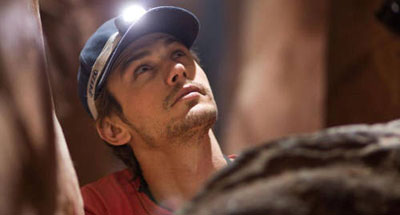 Forget Franco’s failing duties as an Oscar host. His performance in “127 Hours” was the most award-worthy of the year. Under Danny Boyle’s brilliant directing, Franco managed to play the entire range of emotions while being the only actor on screen for much of the film. Sure, I liked Colin Firth in “The King’s Speech,” but that was the overhyped of the year, and it was apparently Colin Firth’s time.
Forget Franco’s failing duties as an Oscar host. His performance in “127 Hours” was the most award-worthy of the year. Under Danny Boyle’s brilliant directing, Franco managed to play the entire range of emotions while being the only actor on screen for much of the film. Sure, I liked Colin Firth in “The King’s Speech,” but that was the overhyped of the year, and it was apparently Colin Firth’s time.
ADDITIONAL MENTIONS
Though he has won the Oscar, Robert De Niro had several Oscar-nominated performances over the years that he could have won but the competition was just too stiff. In particularly, he lost a statuette for “Awakenings” in 1990 to Jeremy Irons for “Reversal of Fortune.” Similarly, the next year, he lost a “Cape Fear” Oscar to Anthony Hopkins for “Silence of the Lambs.” These aren’t necessarily snubs, as both Irons and Hopkins were good enough to beat him. Of course, turnabout is fair play, considering De Niro deservedly won the Oscar for “Raging Bull” in 1980 when John Hurt could have also won for “The Elephant Man.”
The one odd-year-old for me in recent memory was 1992 when pretty much anyone should have won the Oscar instead of Al Pacino getting it for “Scent of a Woman.” Well, probably not Pauly Shore for “Encino Man,” but Robert Downey Jr. for “Chaplin,” Clint Eastwood for “Unforgiven,” Stephen Rea for “The Crying Game” or Denzel Washington for “Malcolm X” would have been a better choice.
